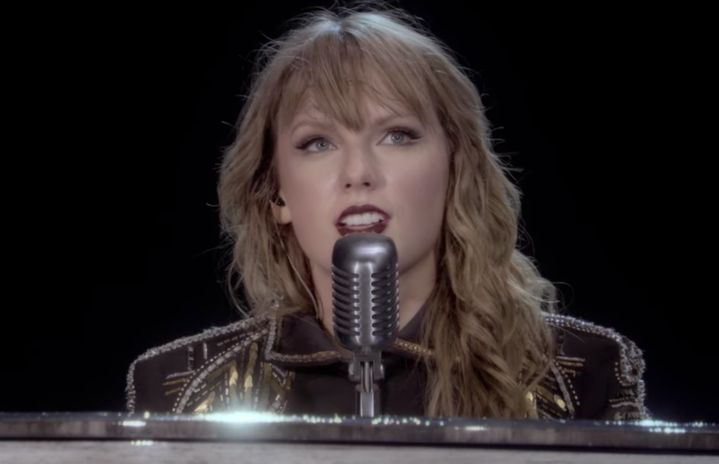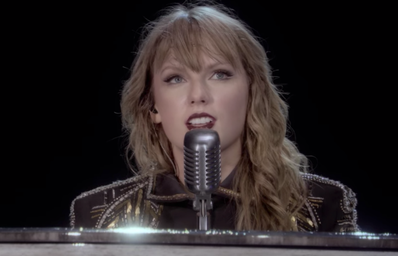With 11 Grammys, the most Spotify streams of any female artist in the world and an impressive discography of well over 100 released songs (over 50 of which she is credited as the sole writer), you would think Taylor Swift would be done having to prove herself as a true artist in the music industry.
Unfortunately, it seems there will always be people, especially men, attempting to discredit Swift and her well-deserved accomplishments.
The most recent example of this occurred when Damon Albarn, lead singer and songwriter of Blur and Gorillaz, attacked Swift’s songwriting abilities in a Los Angeles Times interview. Albarn ignorantly claimed that Swift “doesn’t write her own songs.”
After being corrected by the interviewer who explained that she does write and co-write all her songs, Albarn added that co-writing “doesn’t count” as songwriting. Albarn went on to compare Swift to fellow female singer and songwriter Billie Eilish saying that Eilish is a “really interesting songwriter” and that when it comes to her music he is “more attracted to that than to Taylor Swift. It’s just darker—less endlessly upbeat. Way more minor and odd. I think she’s exceptional.”
There’s a lot to unpack in Albarn’s comments. First of all, discrediting women for their work is something that is very deeply rooted in our society.
The Blur frontman is far from the first man to belittle a woman’s abilities. We see this happening all throughout history, in pretty much every industry. For example, on many occasions men have stolen credit from women who have made notable accomplishments in the science community.
The music industry is no different, and artists like Taylor Swift have to fight hard to be taken seriously. Albarn’s instinct to continue to discredit Swift, even after being corrected by the interviewer, changing his argument from she “doesn’t write her own songs” to “co-writing doesn’t count” is a perfect example of how men will go out of their way and work so hard to minimize women’s accomplishments rather than just admitting that women can be talented and intelligent.
Now let’s dive into Albarn’s comparison of Swift to Billie Eilish. Women in the music industry are constantly pitted against one another, so it comes as no surprise that Albarn felt the need to put down one female artist to compliment another.
It’s one thing to prefer a certain artist over another, but it’s completely different to discredit one as a writer entirely. Even Albarn’s preference in this case, though, seems to be rooted in “femmephobia.”
Stereotypically feminine attributes are often devalued in our society, especially when it comes to the arts. Hating artists like Taylor Swift, Justin Bieber, and One Direction was once seen as the cool thing to do because these were all musicians that had a majority female fanbase.
When many women enjoy something feminine, people are quick to call it “basic” or “not real art.” However when a lot of men enjoy something that society deems “manly” but isn’t particularly deep or artistic no one bats an eye.
Women are made fun of for enjoying romcoms, which are seen as feminine, while men are free to obsess over “Marvel” movies, which are mostly focused on male characters. People have much too hard of a time simply letting others enjoy feminine things without judgment.
In the interview, Albarn cites Eilish’s music as unlike Swift’s because it’s “dark” and not “endlessly upbeat.” While generalizing Swift’s music “endlessly upbeat” is incredibly far from the truth, it wouldn’t be less worthy or deserving of credit even if it was.
Art doesn’t have to be dark or not upbeat to be good, and music can have feminine sounds and lyrics and still be meaningful. Swift has always presented herself and her music in a more feminine way than Eilish, and it’s clear that has contributed to the views society has of the two artists.
The music industry is practically swimming in sexism, and coming for young women’s songwriting abilities seems to be one of the industry’s favorite pastimes. Thankfully this hasn’t been going on without pushback, and talented women are continuing to fight to be credited for their work.
Swift in particular is no stranger to men taking credit away from her and is currently in the process of re-recording her music to take ownership of her masters.
I hope men in the industry are realizing how problematic discrediting female artists can be, and learning not to make harmful comments like the one’s from Albarn’s interview which might as well be titled: “Tell Us You Didn’t Listen to Folklore and Evermore Without Telling Us You Didn’t Listen to Folklore and Evermore.”


